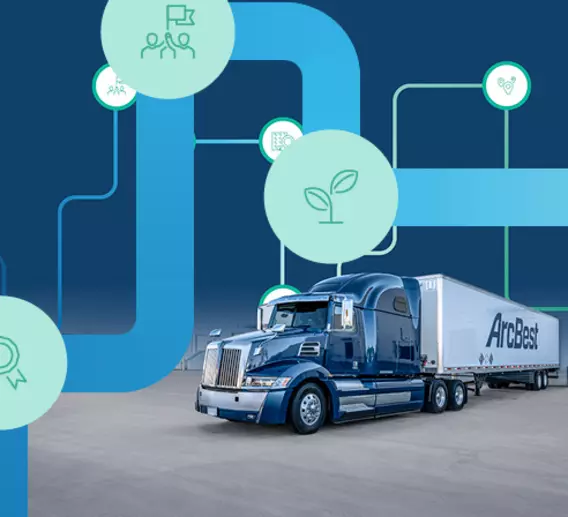Building a better future through sustainable logistics practices
So much has changed since loading our first shipment as a local freight hauler in 1923. But ArcBest’s willingness to evolve alongside the needs of our customers and the world around us has remained. One part of this journey is a focus on environmental sustainability.
The first steps in a long history of practical changes
Since our founding, we’ve prioritized maximizing efficiency while improving our services and offerings. As our business grew and our network expanded, we started focusing on reducing fuel consumption and extending vehicle life. Some of those first initiatives included:
Utilizing optimized routing systems to reduce empty miles and lower fuel consumption
Adopting preventative maintenance programs to extend vehicle life and minimize downtime
Introducing speed limiters in ABF Freight trucks to help conserve fuel
Through the 1980s and 90s, our teams developed additional ways to maintain and operate equipment. Computerized engine shut-off systems minimized idle time, and increased fuel efficiency, reducing the environmental impact and cost of deliveries.
In the 2000s, ABF Freight became one of the early EPA SmartWay® Transport Partners, formalizing our commitment to cleaner transportation and carbon-reduction practices. Since then, we’ve continued building on our long-standing culture of accountability, innovation and care for our people, customers and communities.
Making a real impact as we do business
Our early initiatives laid the groundwork for today’s sustainability programs. Over the years, we’ve expanded these efforts with projects that reduce emissions, improve efficiency and enhance safety and working conditions. Some highlights include:
Transparent emissions reporting. We voluntarily disclose Scope 1 and Scope 2 greenhouse gas emissions to benchmark our improvements and guide us as we plan future advancements.
Electrifying yard operations. Because yard tractors run short, repetitive routes and have built-in opportunities for charging between uses, they are well suited for battery-electric power. In 2013, we doubled the number of electric yard tractors in the ABF network, allowing us to cut emissions strategically in locations where equipment is in frequent stop-and-go use.
Piloting renewable natural gas vehicles. We worked with Chevron and Cummins to test a Cummins X15N engine and assess the advantages of adding RNG vehicles into our operations.
Expanding capacity with efficiency in mind. More than 300 new dock doors were added across service centers to improve loading efficiency, minimize idling and reduce congestion.
Piloted electric semi-trucks for over-the-road operations. While ArcBest already utilizes electric yard tractors, forklifts and Class 6 straight trucks, we evaluated the use of a Class 8 long-range Tesla semi across dispatch lanes, gauging efficiency, performance and driver acceptance.
Measuring and disclosing our actions
To share the progress of these programs transparently, we began publishing our Impact Report (previously called our Environmental, Social and Corporate Governance Report) in 2019 as a way to measure and communicate the work we’ve been doing.
These reports use our data, goals and governance to compare and align us with leading global frameworks SASB and TCFD and utilize assessments such as EcoVadis, CDP and S&P Global CSA, so that customers, investors and other stakeholders can better understand how partnering with ArcBest’s sustainability efforts can impact their supply chain.
Continuing to innovate and measure impact
As we build on decades of initiatives, we’re focused on expanding existing programs and finding new ways to improve. Transparency will remain central to our approach as we take steps toward comprehensive measurement of indirect Scope 3 emissions, to give us a better picture of our total environmental impact.
Looking ahead, we plan to evaluate low-emission and alternative fuel solutions, continuing our pilots with renewable natural gas and adding electrification where it makes operational sense. We’re also creating a safer logistics industry, with the rollout of Vaux Smart Autonomy™ material-handling technology, which enhances warehouse safety and reduces rework.
Recognition that validates our actions
As we continue growing our sustainability efforts, we’re honored to be recognized by organizations that measure, assess and reward corporate impact.
Some of our recent awards include:
America’s Most Responsible Companies 2025 and America’s Climate Leaders 2025 (Newsweek/Statista). ArcBest ranked 8th in Transport & Logistics, reflecting our environmental initiatives and broader approach to corporate responsibility.
Inbound Logistics Green (G75) Supply Chain partner. For the 14th time, ArcBest was named one of the 75 leading organizations that positively impact sustainability in supply chain and logistics operations.
2024 BNSF Railway Sustainability Award. ABF won this award, highlighting environmental achievements and sustainability technology implementation.
2024 EPA SmartWay Leader. ArcBest received this honor in the Information System and Data Innovation category for our less-than-truckload City Route Optimization technology, which resulted in fewer miles driven, less fuel consumption and a reduced carbon footprint.
2024 EcoVadis Commitment Badge. ArcBest scored 59/100 in the 57th percentile compared to more than 130,000 companies worldwide in the categories of Environment, Labor and Human Rights, Ethics and Sustainable Procurement.
A century of progress toward a better future
From making efficient routes in 1923 to using alternative fuels, we have a long history of reducing environmental impact while improving service. Every mile we travel and every upgrade we make reflects our commitment to a cleaner, more responsible logistics industry that will continue to drive us forward for another 100 years.







